3 nov 2019
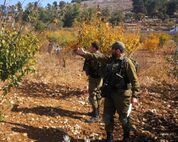
Israeli soldiers and the so-called “Civil Administration Office, the executive branch of Tel Aviv’s occupation of Palestine, has started digging and preparing to pave a new segregated road for illegal colonialist settlers in Beit Ummar town, north of the southern West Bank city of Hebron.
Local nonviolent activist, Mohammad Awad, said the soldiers accompanied by several bulldozers and other heavy equipment, started bulldozing and uprooting the privately-owned Palestinian lands near Beit al-Baraka, which is illegally occupied by colonialist settlers. video
Awad added that Israel is planning to pave a new road passing near Hebron-Jerusalem Road, and that the soldiers declared the area “a closed military zone,” before preventing the farmers and landowners from entering it.
The lands are at least 90 Dunams (22.23 Acres), owned by Palestinians from Safi and Sleibi families, and are planted with olive grapes and almond trees.
Abdul-Hadi Hantash, a Palestinian expert in Israeli colonialist affairs and maps, said the new road will pass through several kilometers on private, fertile lands, extending from Etzion Junction, north of Hebron, and passing near Beit al-Baraka in the opposite direction of the al-‘Arroub refugee camp, all the way through “Jabal al-Qarn” natural reserve between Beit Ummar and al-‘Arroub.
He added that the planned road would also extend to Nabi Younis Junction at the southern entrance of Halhoul town, and would eventually lead to the illegal annexation of about 400 Dunams (98.84 acres) of Palestinian lands in Beit Ummar and Halhoul towns.
Hantash stated that this new road is meant to boost Israel’s policies of segregation and annexation, to advance its plans for constructing and expanding its illegal colonies, built on occupied lands in direct violation of International Law and the Fourth Geneva Convention.
In 2016, the United Nations Office for the Coordination of Humanitarian Affairs (OCHA) issued a report about the Israeli plan to establish a new colony in the property of Beit al-Baraka, meaning “House of Blessing,” built 70 years earlier on a 38-dunam (9.5-acre) church compound located on the main road between Bethlehem and Hebron, opposite to Arroub refugee camp, and warned of humanitarian concerns resulting from his plan.
Beit al-Baraka also used to serve as a hospital providing free treatment to people suffering from tuberculosis until it was shut down in 1983. Jewish settlers later bought the compound from the church, through a fake company.
Local nonviolent activist, Mohammad Awad, said the soldiers accompanied by several bulldozers and other heavy equipment, started bulldozing and uprooting the privately-owned Palestinian lands near Beit al-Baraka, which is illegally occupied by colonialist settlers. video
Awad added that Israel is planning to pave a new road passing near Hebron-Jerusalem Road, and that the soldiers declared the area “a closed military zone,” before preventing the farmers and landowners from entering it.
The lands are at least 90 Dunams (22.23 Acres), owned by Palestinians from Safi and Sleibi families, and are planted with olive grapes and almond trees.
Abdul-Hadi Hantash, a Palestinian expert in Israeli colonialist affairs and maps, said the new road will pass through several kilometers on private, fertile lands, extending from Etzion Junction, north of Hebron, and passing near Beit al-Baraka in the opposite direction of the al-‘Arroub refugee camp, all the way through “Jabal al-Qarn” natural reserve between Beit Ummar and al-‘Arroub.
He added that the planned road would also extend to Nabi Younis Junction at the southern entrance of Halhoul town, and would eventually lead to the illegal annexation of about 400 Dunams (98.84 acres) of Palestinian lands in Beit Ummar and Halhoul towns.
Hantash stated that this new road is meant to boost Israel’s policies of segregation and annexation, to advance its plans for constructing and expanding its illegal colonies, built on occupied lands in direct violation of International Law and the Fourth Geneva Convention.
In 2016, the United Nations Office for the Coordination of Humanitarian Affairs (OCHA) issued a report about the Israeli plan to establish a new colony in the property of Beit al-Baraka, meaning “House of Blessing,” built 70 years earlier on a 38-dunam (9.5-acre) church compound located on the main road between Bethlehem and Hebron, opposite to Arroub refugee camp, and warned of humanitarian concerns resulting from his plan.
Beit al-Baraka also used to serve as a hospital providing free treatment to people suffering from tuberculosis until it was shut down in 1983. Jewish settlers later bought the compound from the church, through a fake company.
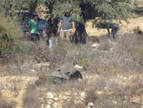
In yet another violation, several illegal Israeli colonialist settlers, illegally squatting on Palestinian lands near the northern West Bank city of Nablus, invaded a Palestinian olive orchard, and harvested nearly 300 trees before stealing the produce.
Ghassan Daghlas, a Palestinian official who monitors Israel’s colonialist activities in northern West Bank, said the Israeli assailants came from Rahalim nearby illegal colony, which was built on stolen Palestinian lands.
He added that the assailants harvested and stole the produce of nearly 300 Palestinian olive trees, before fleeing to their colony.
The official also stated that, once the Palestinians were able to enter their orchards, isolated behind the Annexation Wall, some colonists attacked them and forced them away, while the soldiers did not intervene.
On Saturday, the soldiers invaded Palestinian olive orchards between Burin and Huwwara towns, south of Nablus, and forced the Palestinians out, in addition to threatening them with “binging the settlers to attack them.”
It is worth mentioning that the Palestinians in Nablus governorate are not allowed to enter more than 3500 Dunams of their olive orchards, except for a few days a year, after prior coordination and approval from the military.
Even when they receive the permits, the Palestinians and are forced to wait until the soldiers open the gate for them, and sometimes the soldiers do not open it at all or force them to wait for long periods.
On Friday morning, several colonists invaded a Palestinian orchard in Yasuf village, east of the central West Bank city of Salfit, and stole a donkey, blankets and olive picking tools.
Such attacks against Palestinian lands, especially olive orchards, including those carried out by soldiers, take place in various areas across the West Bank, always escalate during the olive harvest season, and include cutting, burning and uprooting trees, picking olive trees and stealing the produce, in addition to assaulting the Palestinians and forcing them out of their orchards.
Ghassan Daghlas, a Palestinian official who monitors Israel’s colonialist activities in northern West Bank, said the Israeli assailants came from Rahalim nearby illegal colony, which was built on stolen Palestinian lands.
He added that the assailants harvested and stole the produce of nearly 300 Palestinian olive trees, before fleeing to their colony.
The official also stated that, once the Palestinians were able to enter their orchards, isolated behind the Annexation Wall, some colonists attacked them and forced them away, while the soldiers did not intervene.
On Saturday, the soldiers invaded Palestinian olive orchards between Burin and Huwwara towns, south of Nablus, and forced the Palestinians out, in addition to threatening them with “binging the settlers to attack them.”
It is worth mentioning that the Palestinians in Nablus governorate are not allowed to enter more than 3500 Dunams of their olive orchards, except for a few days a year, after prior coordination and approval from the military.
Even when they receive the permits, the Palestinians and are forced to wait until the soldiers open the gate for them, and sometimes the soldiers do not open it at all or force them to wait for long periods.
On Friday morning, several colonists invaded a Palestinian orchard in Yasuf village, east of the central West Bank city of Salfit, and stole a donkey, blankets and olive picking tools.
Such attacks against Palestinian lands, especially olive orchards, including those carried out by soldiers, take place in various areas across the West Bank, always escalate during the olive harvest season, and include cutting, burning and uprooting trees, picking olive trees and stealing the produce, in addition to assaulting the Palestinians and forcing them out of their orchards.
2 nov 2019
|
|
In the heart of Khan Younis City in the southern Gaza Strip, Palestinian farmers flock to the local market to sell various kinds of olives and olive oil, announcing a new season of joy and blessing.
The market, which sells the finest kinds of olives and olive oil, has become a central market that has been held annually for several decades. The market opens with the start of the olive season in mid-September until the end of November. In two opposite rows, sellers offer their best goods to buyers. The Palestinian olive trader Mohammed Abu Jazar, 46, said that he has been in the market for 15 years, which has earned him considerable experience in identifying olives and olive oil of high and poor quality. Abu Jazar said that the olive season this year had a relatively weak start, expecting the demand to increase in the coming days. |
The Gaza Strip is known for growing three types of olives: Chemlali, Souri and K18, Abu Jazar noted, adding that although the Gaza Strip people prefer the oil taken from the Souri olives, the oil extracted from the K18 olive is better and healthier.
The prices depend on the olive oil's type and purity. The Souri oil is the most expensive; a gallon is sold for 85 to 95 Jordanian dinars. A gallon of K18 oil is sold for 60 to 70 Jordanian dinars, while a gallon of Chemlali oil is sold for 70 to 85 Jordanian dinars.
The Gazans prefer the Souri olives and use them for pickling and oil extraction, while the Chemlali and K18 olives are mainly used for oil production.
The prices depend on the olive oil's type and purity. The Souri oil is the most expensive; a gallon is sold for 85 to 95 Jordanian dinars. A gallon of K18 oil is sold for 60 to 70 Jordanian dinars, while a gallon of Chemlali oil is sold for 70 to 85 Jordanian dinars.
The Gazans prefer the Souri olives and use them for pickling and oil extraction, while the Chemlali and K18 olives are mainly used for oil production.

Israeli settlers on Saturday morning attacked a Palestinian family in Dura town near the West Bank city of al-Khalil.
Local sources said that a group of Israeli settlers stormed a farmland owned by the Al Mohammed family in the western area of Dura town, and when the land owners confronted the settlers they violently assaulted them.
They added that Israeli forces rushed to the place and fired poisonous gas canisters at the Palestinian family. Two citizens suffered breathing difficulties and were treated in the field by Red Crescent crews.
Local sources said that a group of Israeli settlers stormed a farmland owned by the Al Mohammed family in the western area of Dura town, and when the land owners confronted the settlers they violently assaulted them.
They added that Israeli forces rushed to the place and fired poisonous gas canisters at the Palestinian family. Two citizens suffered breathing difficulties and were treated in the field by Red Crescent crews.
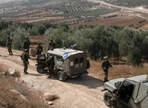
Israeli soldiers invaded, Saturday, Palestinian olive orchards between Burin and Huwwara towns, south of the northern West Bank city of Nablus, and forced the Palestinians out, in addition to threatening them with “bringing the settlers to attack them.”
Eyewitnesses said the soldiers invaded the orchards near the illegal Yitzhar colony, which was built on private Palestinian lands, and attacked the families.
The soldiers even told the families that if they do not leave, they will bring the colonists from Yitzhar, known for constantly attacking the Palestinians and their lands, to assault them.
The olive harvest season in the occupied West Bank is always accompanied by dozens of Israeli violations by both the soldiers and the illegal colonists.
There have numerous violations this olive harvest season alone, including twelve just recently in Qaryout village, south of Nablus.
The attacks include assaulting the Palestinians, uprooting their trees, burning their lands and orchards, in addition to the military’s refusal in many cases to allow the Palestinians into their lands, isolated behind the illegal Annexation Wall.
It is worth mentioning that the Palestinians in Nablus governorate are not allowed to enter more than 3500 Dunams of their olive orchards, except for a few days a year, after prior coordination and approval from the military.
Even when they receive the permits, the Palestinians and are forced to wait until the soldiers open the gate for them, and sometimes the soldiers do not open it at all or force them to wait for long periods.
On Friday morning, several colonists invaded a Palestinian orchard in Yasuf village, east of the central West Bank city of Salfit, and stole a donkey, blankets and olive picking tools.
Such attacks against Palestinian lands, especially olive orchards, including those carried out by soldiers, take place in various areas across the West Bank, always escalate during the olive harvest season, and include cutting, burning and uprooting trees, picking olive trees and stealing the produce, in addition to assaulting the Palestinians and forcing them out of their orchards.
Eyewitnesses said the soldiers invaded the orchards near the illegal Yitzhar colony, which was built on private Palestinian lands, and attacked the families.
The soldiers even told the families that if they do not leave, they will bring the colonists from Yitzhar, known for constantly attacking the Palestinians and their lands, to assault them.
The olive harvest season in the occupied West Bank is always accompanied by dozens of Israeli violations by both the soldiers and the illegal colonists.
There have numerous violations this olive harvest season alone, including twelve just recently in Qaryout village, south of Nablus.
The attacks include assaulting the Palestinians, uprooting their trees, burning their lands and orchards, in addition to the military’s refusal in many cases to allow the Palestinians into their lands, isolated behind the illegal Annexation Wall.
It is worth mentioning that the Palestinians in Nablus governorate are not allowed to enter more than 3500 Dunams of their olive orchards, except for a few days a year, after prior coordination and approval from the military.
Even when they receive the permits, the Palestinians and are forced to wait until the soldiers open the gate for them, and sometimes the soldiers do not open it at all or force them to wait for long periods.
On Friday morning, several colonists invaded a Palestinian orchard in Yasuf village, east of the central West Bank city of Salfit, and stole a donkey, blankets and olive picking tools.
Such attacks against Palestinian lands, especially olive orchards, including those carried out by soldiers, take place in various areas across the West Bank, always escalate during the olive harvest season, and include cutting, burning and uprooting trees, picking olive trees and stealing the produce, in addition to assaulting the Palestinians and forcing them out of their orchards.
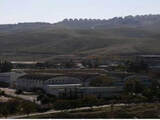
The Israeli Information Center for Human Rights In The Occupied Territories (B’Tselem): Israel to establish waste-to-energy plant in settlement of Ma’ale Adumim, unlawfully exploiting Palestinian territory for its own needs In October 2019, the Israeli government issued a tender for the establishment of its first waste-to-energy plant, at an estimated cost of 1 billion NIS (about 284 million USD).
While this may seem an ecologically positive development, the plant is set to be built within the West Bank, despite the prohibition in international law on exploiting resources in an occupied territory for the benefit of the occupying power. If established, the plant will be built without taking the Palestinian population of the West Bank and its views on the matter into account.
The site for the plant lies between East Jerusalem and the Dead Sea, some 700 meters east of the Mishor Adumim industrial park near the Good Samaritan site and within the municipal jurisdiction of the settlement of Ma’ale Adumim. Israel expropriated this land back in 1975.
Like all Israeli settlements in the West Bank, Ma’ale Adumim is illegal under international law. Several hundred meters away from the site there are small, isolated Palestinian shepherd communities. The project is the initiative of the Ma’ale Adummim Planning and Development Corporation. Settlement mayor Benny Kashriel argues that it will serve “major parts of Israel” and should, therefore, become “a national project”. Indeed, the Ministry of Environmental Protection has included the facility in its 2030 strategic plan [pdf] for the treatment of urban waste.
The plant is set to open in 2025 and to serve Israeli authorities within the metropolitan area of Jerusalem. It is expected to reduce the transfer of waste to landfills – the most common form of waste treatment in Israel and in the West Bank – as well as increase waste recycling by 2.5 and transform some 25% into energy.
According to the plans, the plant will span some five hectares and treat enormous quantities ranging from 1,000 to 1,500 tons of waste a day – including domestic waste, electronic waste and polluted soil. It will contain a sorting facility that can process about 2,000 tons a day. Waste that is found unsuitable for incineration will be sent on to recycling or to a landfill.
According to the Ma’ale Adumim municipality, the plant will service local authorities that consist of some 1 million people, including Palestinian authorities, within a 40-km range. The specific authorities have not yet been named, other than the city of Jerusalem and the settlement of Ma’ale Adumim.
In 2019, Israel and the EU signed an agreement [pdf] as part of the EU’s twinning instrument, which establishes cooperation with the EU’s neighboring countries, guaranteeing Israel approximately 1.5 million euros over the next two years to support the Ministry of Environmental Protection’s implementation of its 2030 strategic plan. In the agreement, Israel committed to creating a legal framework that adopts European practices and standardization for sustainable waste treatment.
As in every agreement between the EU and Israel, it contains a territorial clause , that stipulates that it will not apply beyond Israel’s 1967 borders. Yet the EU’s support for the ministry’s strategic plan – which defines the establishment of the plant at Ma’ale Adumim as a goal and presents the exploitation of West Bank land to resolve environmental problems as a matter of course – empties this annex of meaning.
By supporting this plan, the EU will be supplying Israel with knowledge and experience that will help deepen its exploitation of Palestinian land resources and bolster the economic status of the Ma’ale Adumim settlement.
For many years, Israel has been taking advantage of its power as occupier to transfer the treatment of waste (including hazardous waste) and sewage from its sovereign territory to the West Bank. To that end, it has created a situation in which environmental legislation in the West Bank is much laxer than inside Israel, conveniently overlooking the long-term impact of environmental hazards on the Palestinian population and on natural resources, and neglecting to prepare future rehabilitation plans.
This has created a financial incentive to transfer the treatment of environmental hazards from Israel to the West Bank. The Palestinians who live in the occupied territory are the ones to pay the price for this environmental damage, even though they were never asked their opinion on the matter and although, as a population under occupation, they have no political power and no real ability to resist.
While this may seem an ecologically positive development, the plant is set to be built within the West Bank, despite the prohibition in international law on exploiting resources in an occupied territory for the benefit of the occupying power. If established, the plant will be built without taking the Palestinian population of the West Bank and its views on the matter into account.
The site for the plant lies between East Jerusalem and the Dead Sea, some 700 meters east of the Mishor Adumim industrial park near the Good Samaritan site and within the municipal jurisdiction of the settlement of Ma’ale Adumim. Israel expropriated this land back in 1975.
Like all Israeli settlements in the West Bank, Ma’ale Adumim is illegal under international law. Several hundred meters away from the site there are small, isolated Palestinian shepherd communities. The project is the initiative of the Ma’ale Adummim Planning and Development Corporation. Settlement mayor Benny Kashriel argues that it will serve “major parts of Israel” and should, therefore, become “a national project”. Indeed, the Ministry of Environmental Protection has included the facility in its 2030 strategic plan [pdf] for the treatment of urban waste.
The plant is set to open in 2025 and to serve Israeli authorities within the metropolitan area of Jerusalem. It is expected to reduce the transfer of waste to landfills – the most common form of waste treatment in Israel and in the West Bank – as well as increase waste recycling by 2.5 and transform some 25% into energy.
According to the plans, the plant will span some five hectares and treat enormous quantities ranging from 1,000 to 1,500 tons of waste a day – including domestic waste, electronic waste and polluted soil. It will contain a sorting facility that can process about 2,000 tons a day. Waste that is found unsuitable for incineration will be sent on to recycling or to a landfill.
According to the Ma’ale Adumim municipality, the plant will service local authorities that consist of some 1 million people, including Palestinian authorities, within a 40-km range. The specific authorities have not yet been named, other than the city of Jerusalem and the settlement of Ma’ale Adumim.
In 2019, Israel and the EU signed an agreement [pdf] as part of the EU’s twinning instrument, which establishes cooperation with the EU’s neighboring countries, guaranteeing Israel approximately 1.5 million euros over the next two years to support the Ministry of Environmental Protection’s implementation of its 2030 strategic plan. In the agreement, Israel committed to creating a legal framework that adopts European practices and standardization for sustainable waste treatment.
As in every agreement between the EU and Israel, it contains a territorial clause , that stipulates that it will not apply beyond Israel’s 1967 borders. Yet the EU’s support for the ministry’s strategic plan – which defines the establishment of the plant at Ma’ale Adumim as a goal and presents the exploitation of West Bank land to resolve environmental problems as a matter of course – empties this annex of meaning.
By supporting this plan, the EU will be supplying Israel with knowledge and experience that will help deepen its exploitation of Palestinian land resources and bolster the economic status of the Ma’ale Adumim settlement.
For many years, Israel has been taking advantage of its power as occupier to transfer the treatment of waste (including hazardous waste) and sewage from its sovereign territory to the West Bank. To that end, it has created a situation in which environmental legislation in the West Bank is much laxer than inside Israel, conveniently overlooking the long-term impact of environmental hazards on the Palestinian population and on natural resources, and neglecting to prepare future rehabilitation plans.
This has created a financial incentive to transfer the treatment of environmental hazards from Israel to the West Bank. The Palestinians who live in the occupied territory are the ones to pay the price for this environmental damage, even though they were never asked their opinion on the matter and although, as a population under occupation, they have no political power and no real ability to resist.
1 nov 2019
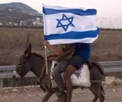
Several illegal Israeli colonists invaded, on Friday morning, a Palestinian orchard in Yasuf village, east of the central West Bank city of Salfit, and stole a donkey, blankets and olive picking tools.
Eyewitnesses said the Israeli assailants came from Taffuh illegal colony, which was built on Palestinian lands, owned by Yasuf villagers.
They added that the colonists stole a donkey, in addition to blankets and olive picking tools, owned by a local farmer, identified as Jabr Abdul-Hamid Bayer.
The attack in that area is one of the dozens of violations carried out by the colonists against the Palestinians, who are just trying to enter their lands isolated behind the illegal Annexation Wall, especially those adjacent to the Ariel colony, east of west of Salfit.
Such attacks, including those carried out by soldiers, take place in various areas across the occupied West Bank, always escalate during the olive harvest season, and include cutting, burning and uprooting trees, picking olive trees and stealing the produce, in addition to assaulting the Palestinians and forcing them out of their orchards.
The orchards were this attack took place are isolated behind the illegal Annexation Wall, while the Palestinians have to obtain permits from the army to enter their own lands, and are forced to wait until the soldiers open the gate for them, and sometimes the soldiers do not open it at all, or force them to wait for longer periods.
Eyewitnesses said the Israeli assailants came from Taffuh illegal colony, which was built on Palestinian lands, owned by Yasuf villagers.
They added that the colonists stole a donkey, in addition to blankets and olive picking tools, owned by a local farmer, identified as Jabr Abdul-Hamid Bayer.
The attack in that area is one of the dozens of violations carried out by the colonists against the Palestinians, who are just trying to enter their lands isolated behind the illegal Annexation Wall, especially those adjacent to the Ariel colony, east of west of Salfit.
Such attacks, including those carried out by soldiers, take place in various areas across the occupied West Bank, always escalate during the olive harvest season, and include cutting, burning and uprooting trees, picking olive trees and stealing the produce, in addition to assaulting the Palestinians and forcing them out of their orchards.
The orchards were this attack took place are isolated behind the illegal Annexation Wall, while the Palestinians have to obtain permits from the army to enter their own lands, and are forced to wait until the soldiers open the gate for them, and sometimes the soldiers do not open it at all, or force them to wait for longer periods.
Page: 44 - 43 - 42 - 41 - 40 - 39 - 38 - 37 - 36 - 35 - 34 - 33 - 32 - 31 - 30 - 29 - 28 - 27 - 26 - 25 - 24 - 23
